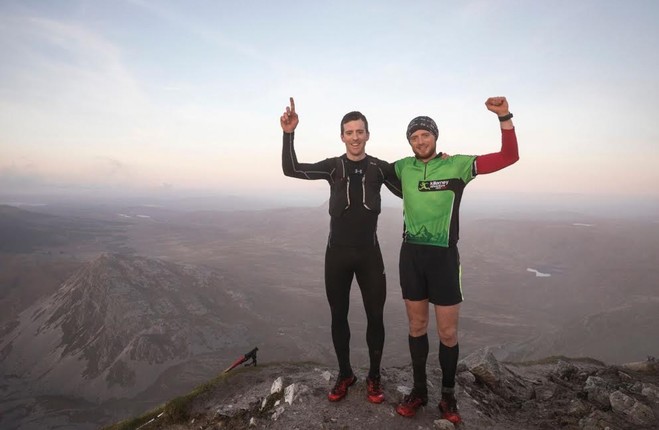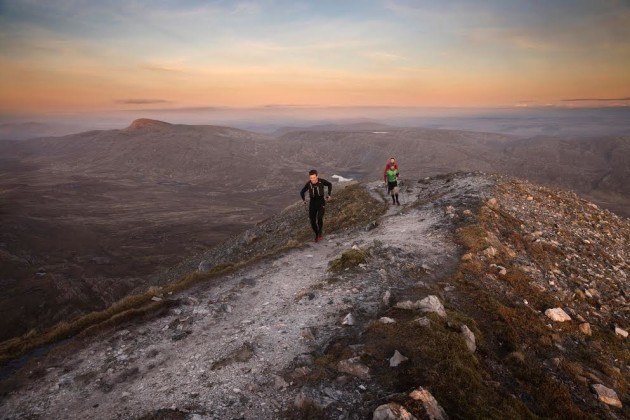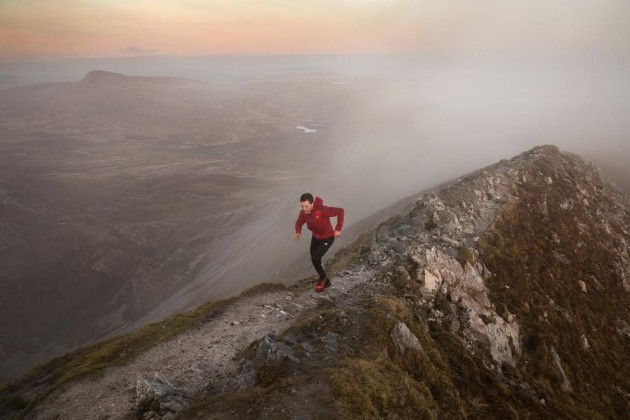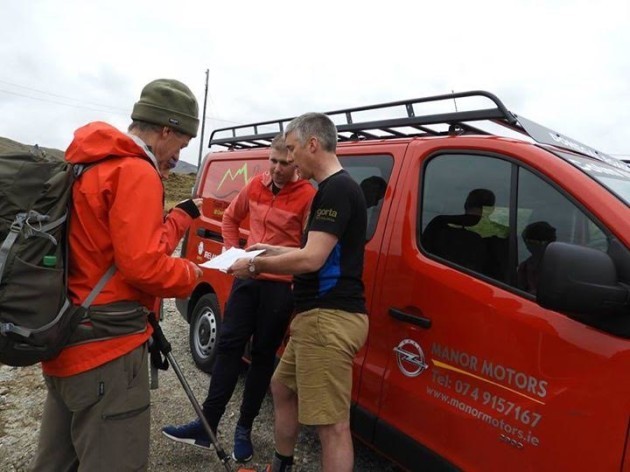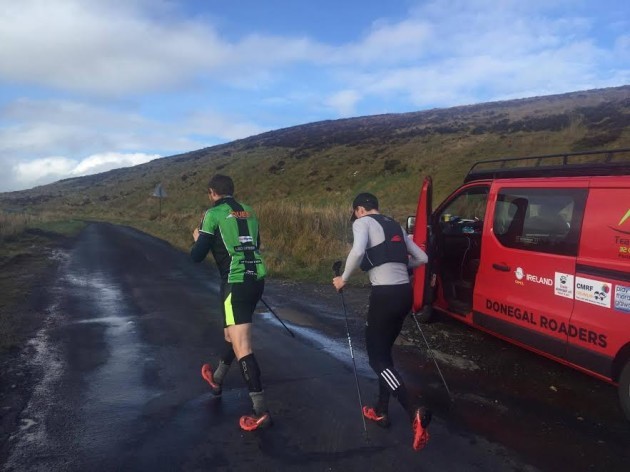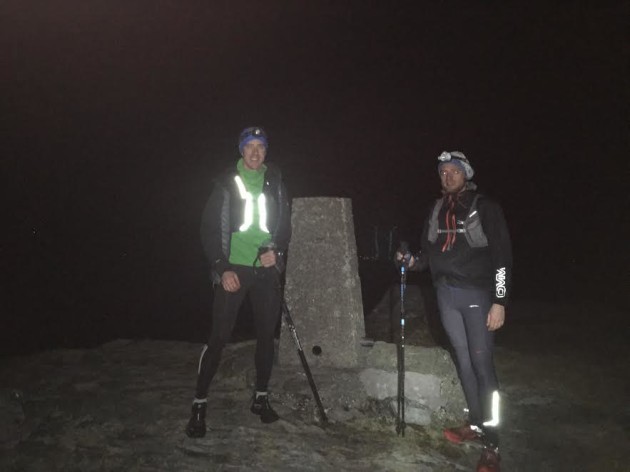BEING ONE OF Ireland’s top adventure racers is not always as glamorous as it sounds.
Shaun Stewart and Lonan O’Farrell’s attempt to climb Ireland’s 26 highest peaks across the 32 counties in record time was not without its difficult moments. The grueling challenge involved eating on the go and sleeping only while travelling between locations, and frequently running during this impossibly intense and arduous journey in order to save time.
“The lowlight was probably climbing Monaghan, Sliabh Beagh,” Stewart tells The42. “It was pretty miserable. It was our second night. It was probably four or five in the morning. We weren’t even in the mountains, it’s a bog, and every step, there was just water coming over your ankles. We were just in really bad form at that stage.
There was no scenery, no view to be had, it was a flat, sparse bog. It was just nice to see the sunrise and the night (turn into a new day). That was probably the lowest point of the challenge, though it was okay, we were getting through it.”
Not only did they get through it, they completed this mammoth task, with less than four hours sleep each, in a very impressive time of 60 hours and 35 minutes. In doing so, they comfortably beat the previous record (87 hours and 50 minutes) by over 27 hours, ascending and descending more than 10,000 metres in the process, driving a distance of 1800km plus and running up to 160km.
Yet anyone who knows Stewart and O’Farrell well will not be surprised that they managed to pull off this incredible feat of endurance.
Both are accomplished adventurers who started seriously competing around 2010. Stewart, a secondary school teacher from Donegal, has previously taken part in An Post Rás among other cycling events. He also has featured in several adventure races in Ireland and abroad, including Coast-2-Coast and Gaelforce North, both of which he won, as well as the Ultra Trail du Mont Blanc, where he finished 20th.
It was a bit different from the racing that we normally do, there wasn’t as much pressure on us, we could enjoy it a little bit more,” Stewart says of the highest peaks challenge.
O’Farrell, a fisheries officer from Galway, is also a well-known figure in adventure racing circles and the highest peaks challenge was not the first time he had competed as part of a team with Stewart.
The pair came together for the similarly formidable Itera Expedition Race last year, while they are used to going up against each other in fiercely competitive individual events. In The Race, often described as ‘Ireland’s toughest endurance race,’ Stewart came second and O’Farrell finished fourth. Despite these amazing achievements, the former sounds almost disappointed in the way only an avid competitor could be, when the topic is brought up.
I just ran out of steam really, it was bad race management,” he says ruefully of his performance in the event last March. “I lost it with about 11k to go.”
It was while training for this event back in January that the duo started to make plans for the highest peaks challenge. They had originally considered doing it in August, when the weather would likely be much better, but ultimately decided to attempt the feat just six weeks after The Race, capitalising while both were still extremely fit and injury-free.
Belfast-based writer and photographer Kieron Gribbon, who had written a book on the challenge, was consulted. Arthur McMahon from Team Donegal Oil agreed to provide them with a support crew. It was decided that all the money raised would go towards Our Ladies Hospital for Sick Children in Crumlin and the Play Therapy Centre of Lakeview School in Galway (the figure achieved currently stands at over €7,000 combined). And once all those details were clarified, there was just the small matter of the challenge itself to be undertaken.
They set out on the morning of Thursday 20 April before their exhausting journey came to an end on the Saturday evening, less than three days later.
“We decided to start on Mweelrea in Mayo,” O’Farrell explains. “The idea for that was to finish on Errigal in Donegal, because our crew were all from Donegal, and the main charity we were raising money for was for Shaun’s niece in Donegal as well.
But also, in terms of where we’d be at nighttime for the logistics of the crew driving around and for us in the mountains, it was best if we could hit some of the smaller peaks at night. So that’s one of the main reasons why we started in the west — we’d get a couple of the big mountains in during the first day when we were fresh, and we’d have a lot of help along the way from mountain runners and adventure racers trying to do navigation on some of the peaks down around Tipperary, Kerry and Cork.
“We had a schedule and we were going by that schedule, trying to stick to it as closely as we could. We always knew if we were 20 minutes ahead of schedule or behind. We knew if we needed to work harder. That was how things were worked.
It did get cold. We had to layer up at nighttime. There was a lot of mist on the second night in a few of the peaks up in the midlands. But for this time of the year, it was super weather. The only rain we had was in Donard in the North. It was a very wet couple of hours up there, but once you’re moving, you’re absolutely fine.”
The team had only one real scare, when O’Farrell fell ill. They were being driven via van to various locations on their route, when he began to suffer a bout of travel sickness.
“By Saturday morning, I was still sick and the lads were saying to give me a 20-minute break,” he recalls. “So I slept for 20 minutes at the base of Slieve Gullion in Armagh.
Once I perked up and had that rest under my belt, we knew at that stage we would make the finish, we just didn’t know what time we’d do it in.
“In my own head I knew I’d pull through, I was just worried how long it’d take me. I knew I had the fitness to finish, but the travel sickness wasn’t something I’d envisaged at all or even thought about. It was just one of the things we didn’t think about. I wasn’t able to eat and because I wasn’t able to eat, I couldn’t sleep either.”
As a result of these problems, the travelling arrangements were adjusted. O’Farrell was transported via car rather than van from thereon in and this change made life much easier.
It was almost starting to slow us up so much that we had to take action one way or another,” Stewart says, recalling his partner’s problems.
“At that stage, I said: ‘We’re going to take half an hour to an hour, whatever it takes to get this guy steadied up, because if we kept going the way we were going, we probably wouldn’t have finished. He needed that time to re-set. But we were always going to finish. We had enough time stored up. If we had to take two hours, we would have taken it.
All he really needed was just a little block of sleep just to re-set the brain. He got 30-40 minutes and travelled by car for the rest of the day.”
Moreover, the fact that a small amount of sleeping time can make such a big difference provides an insight into the strange way the human mind can work.
It’s like the old (Ernest) Shackleton story, where he would give his crew ‘an hour’s sleep,’ Stewart says. “He would wake them after 10 minutes and tell them they slept for an hour. They didn’t know any different and they felt fine.
“I’ve seen it before with sea sickness. You will continue to feel sick until you actually sleep. It should only be half an hour to an hour to reset whatever’s wrong.
“After the sleep, he was able to eat a little bit — a combination of that and travelling in the car (helped). I think if he continued going in the van, he would have suffered the same problems.
(Lonan and I are) very similar in ability and the way we think. We’re both quite positive when we’re doing things, but at the same time, we know when to speak and when not to speak. When Lonan was going through his bad patch, I felt like saying a lot more, but I didn’t. You could see that he was suffering, me adding to it wasn’t going to help, so by making the call to rest, it helped both of us.”
Aside from an upset stomach due to indigestion on the first night, Stewart’s body — in contrast with his fellow adventurer — “held up great” and actually felt “stronger” as the journey went on.
There was, however, a sense of relief and elation once they reached the finish line, cheered on by a crowd of around 100 people, on the Saturday evening in Donegal.
“It was definitely the hardest thing I’ve done,” O’Farrell says. “Having to get through the sickness side of things made it harder.”
Stewart, who is already planning future challenges involving Mont Blanc in France and a cross-country ski expedition in Norway, disagrees with his teammate on this matter.
“I think I’ve done harder things,” he says. “But it’s all relative. He was suffering and I wasn’t.
The Race was the hardest thing I’ve ever done, the reason being that I was racing all day long from the minute I left the starting line. Whereas with this, you’re able to recover, eat and sleep. You’re able to keep going, but with The Race, I went so deep that there was no coming back from it really.”
Both, however, are agreed on the highlight of the journey.
The view from Carrauntoohil, the highest mountain down in Kerry with the Macgillycuddy’s Reeks mountain range all around the sunset, was just unbelievable. We didn’t want to leave the top, it was just spectacular,” O’Farrell says.
“The second thing was an incident on the first day when a baby ram attacked Shaun. He jumped over some heather, pucked him in the leg and then ran past him and back again to try to get a second go at him. I managed to hit him in the nose with my hiking pole, so that was one of the funnier moments.”
And finally, do they have any advice for aspiring adventurers hoping to follow in their footsteps?
“There’s so much out there now that, there’s no excuse not to do any of it,” Stewart says. “I suppose when I started out, it was kind of frowned upon. I started cycling when I was 12 or 13. There are so many different options and adventure races now that there’s something for everybody.
I would tell anybody not to be afraid of taking on a challenge, because you’ll all get through it, there’s plenty of support there. It’s a big thing now, especially in Donegal, there’s a load of people doing it. The benefits are massive — for me, it’s a great stress reliever.
“So get involved with small groups. Pick targets, don’t go too big, but don’t be afraid to challenge yourself either. The likes of a 5k and then moving to your smaller adventure races (is the way to go).”
If we can do it, anyone can do it,” O’Farrell adds. “When I started, I had never set foot in a race before. I did Gaelforce West in 2010. I think I came in 150th place or something like that. I just enjoyed it so much and when you put the training in, you’ll see improvements. You’d be amazed what you can do with yourself.
“A lot of the long-distance stuff as well, it’s not specifically these crazy athletes that can do it, it’s sometimes just people with the right mentality.”
Click through the following hyperlinks for info on how to donate to Lonan’s charity, Lakeview School in Galway, and Shaun’s charity, Our Lady’s Children’s Hospital, Crumlin.
The42 is on Instagram! Tap the button below on your phone to follow us!
